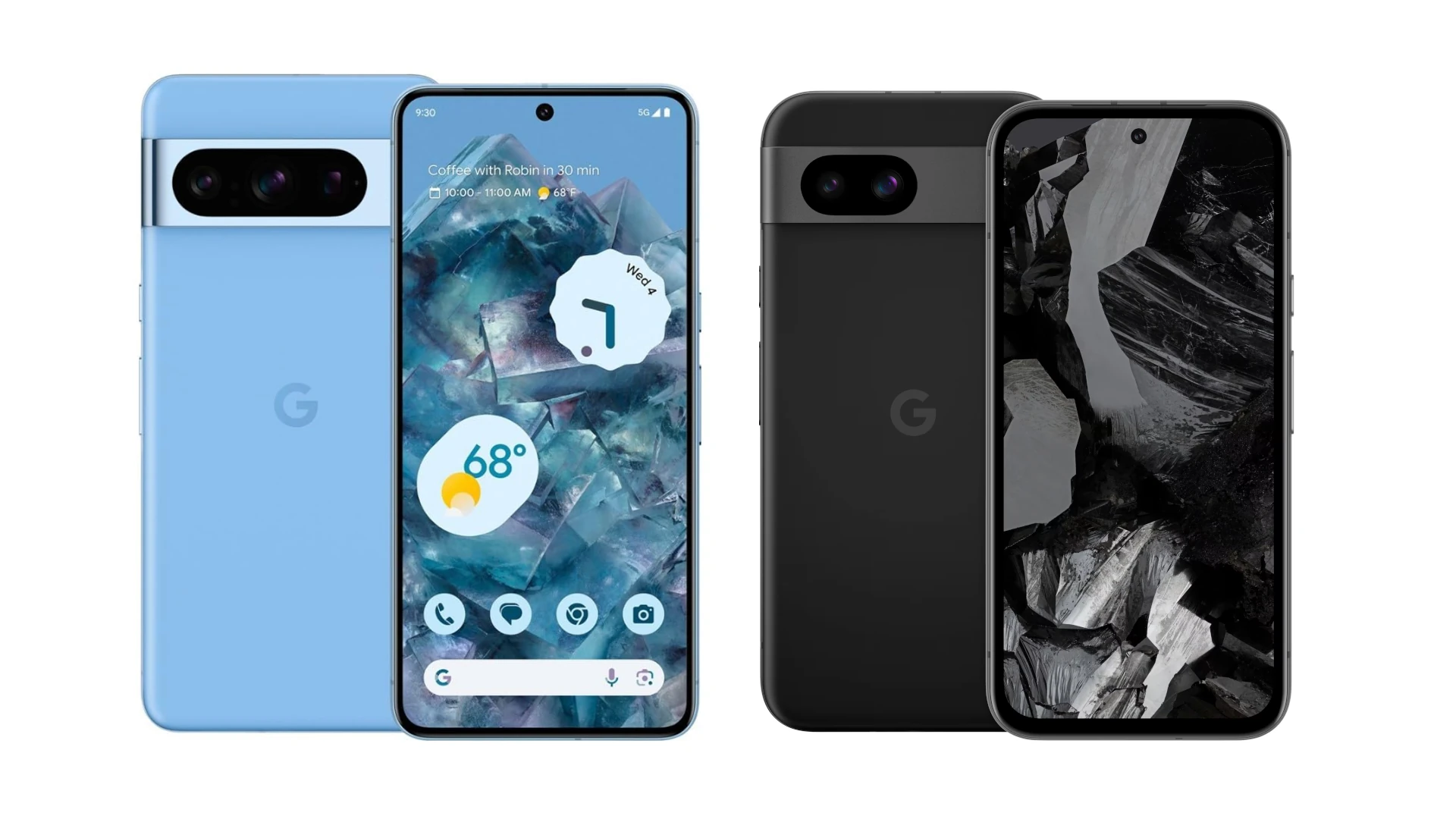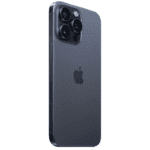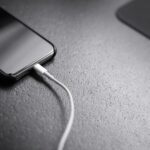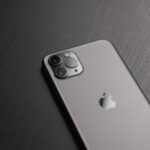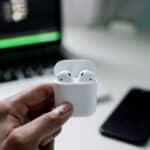Google’s Pixel lineup continues to grow with the introduction of the Pixel 8 and 8a. This 8a model joined the already popular Pixel 8, offering consumers more choice in the mid-range smartphone market. Both phones share many features, but key differences set them apart.
The Pixel 8a offers similar performance to the Pixel 8 at a lower price point. The 8a uses the same Tensor G3 chip as its pricier sibling, ensuring smooth operation for daily tasks and gaming. However, the Pixel 8 boasts a slightly larger 6.2-inch display compared to the 8a’s 6.1-inch screen.
Camera capabilities remain a strong point for both devices. They feature similar main and ultrawide lenses, though the Pixel 8 may have a slight edge in low-light performance. The 8a comes in four color options, giving users more choices for personalization.
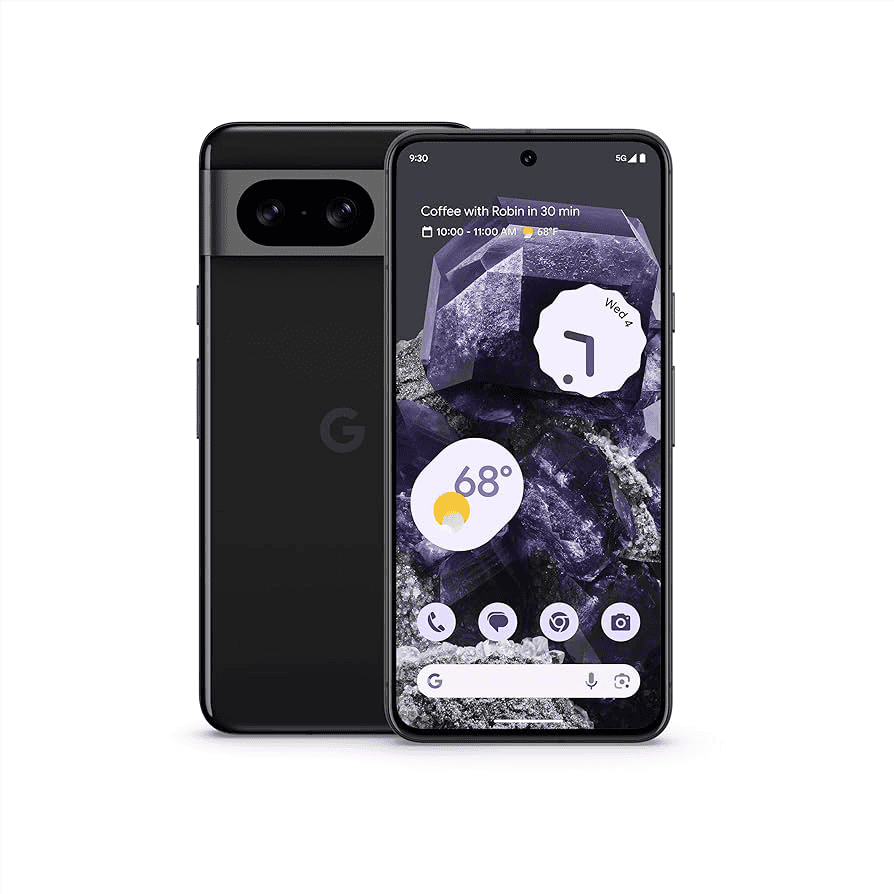
Google Pixel 8 vs. Pixel 8a: A Head-to-Head Comparison
Google’s Pixel phones are renowned for their exceptional camera capabilities and clean Android experience. The Pixel 8 and Pixel 8a, while sharing some similarities, cater to different needs and budgets. Let’s break down their key differences to help you decide which phone is the right fit for you.
Design and Display: Subtle Distinctions
Both phones sport a sleek and modern design with Google’s signature camera bar on the back. However, there are subtle differences:
- Size and Weight: The Pixel 8 is slightly smaller and lighter than the Pixel 8a.
- Display: The Pixel 8 features a 6.2-inch OLED display with a 120Hz refresh rate, while the Pixel 8a has a 6.1-inch OLED display with a 90Hz refresh rate. The Pixel 8’s display is also brighter and offers smoother scrolling.
Camera System: Pixel 8 Takes the Lead
Both phones boast impressive camera systems, but the Pixel 8 has a slight edge:
- Main Sensor: The Pixel 8 utilizes a newer 50MP main sensor, while the Pixel 8a has a 64MP sensor. Despite the lower megapixel count, the Pixel 8’s sensor captures more light and detail, especially in low-light conditions.
- Ultrawide Lens: The Pixel 8’s ultrawide lens has autofocus, allowing it to double as a macro camera. The Pixel 8a’s ultrawide lens has a fixed focus.
- Zoom Capabilities: The Pixel 8 offers Super Res Zoom up to 8x, while the Pixel 8a has Super Res Zoom up to 7x.
Performance and Battery: Similar Under the Hood
Both phones are powered by Google’s Tensor G3 processor, ensuring smooth performance for everyday tasks and demanding applications. They also offer comparable battery life, with the Pixel 8 having a slightly larger battery capacity.
Software and Features: Android 14 with Pixel Exclusives
Both phones run Android 14 with Google’s Pixel-exclusive features, including:
- Call Screen: Screens incoming calls and filters out spam.
- Hold for Me: Waits on hold for you during phone calls and notifies you when a representative is available.
- Live Translate: Translates conversations in real-time.
- Magic Eraser: Removes unwanted objects from photos.
- Photo Unblur: Sharpens blurry photos.
Price and Value: Pixel 8a Offers Affordability
The Pixel 8a is positioned as a more affordable option compared to the Pixel 8. It offers excellent value for its price, with a capable camera system, smooth performance, and a clean Android experience. The Pixel 8, on the other hand, justifies its higher price with a more refined design, a superior camera system, and a smoother display.
Unique Insights: Beyond the Spec Sheet
- Software Updates: Both phones are guaranteed to receive at least five years of software updates from Google, ensuring you have the latest features and security patches.
- AI Integration: Google’s Tensor G3 processor is optimized for AI tasks, enabling features like Magic Eraser and Photo Unblur.
- Sustainability: Both phones incorporate recycled materials in their construction, reflecting Google’s commitment to sustainability.
Pixel 8 vs. Pixel 8a: A Quick Comparison
| Feature | Pixel 8 | Pixel 8a |
|---|---|---|
| Display | 6.2-inch OLED, 120Hz | 6.1-inch OLED, 90Hz |
| Main Camera | 50MP | 64MP |
| Ultrawide Camera | Autofocus, macro capability | Fixed focus |
| Processor | Tensor G3 | Tensor G3 |
| Software Updates | 5 years | 5 years |
| Price | Higher | Lower |

Key Takeaways
- Both phones use the Tensor G3 chip for comparable performance
- The Pixel 8 has a larger display and potentially better low-light camera
- The Pixel 8a offers similar features at a more affordable price
Design and Display
The Pixel 8 and 8a differ in build materials and screen specs. These differences impact their look, feel, and visual experience.
Build Quality and Protection
The Pixel 8 boasts a premium glass and metal build. Its front and back use Gorilla Glass Victus for scratch and drop protection. The frame is made of recycled aluminum.
The 8a opts for a plastic back panel. This makes it lighter but less premium-feeling. Both phones offer strong water resistance. The Pixel 8 has an IP68 rating, while the 8a features IP67 protection.
Color options vary between models. The Pixel 8 comes in Hazel, Rose, and Obsidian. The 8a offers Obsidian, Mint, Bay, and Porcelain.
Screen Quality and Resolution
Both phones use OLED displays with vivid colors and deep blacks. The Pixel 8 has a 6.2-inch screen, while the 8a’s display measures 6.1 inches.
The Pixel 8 edges out the 8a in refresh rate. It offers a smooth 120Hz, while the 8a tops out at 90Hz. This means scrolling and animations look slightly smoother on the 8.
Resolution is similar on both devices. They provide sharp Full HD+ quality. The Pixel 8 gets brighter outdoors, reaching up to 2000 nits peak brightness. The 8a’s max brightness is lower but still good for outdoor use.
Performance and Hardware
The Google Pixel 8 and Pixel 8a share similar hardware but differ in key areas. Both phones use Google’s Tensor G3 chip but have distinct performance profiles. Let’s explore their processing power, battery life, and storage options.
Processing Power
The Tensor G3 chipset powers both the Pixel 8 and Pixel 8a. This chip has a nine-core CPU setup:
- 1x Cortex-X3 core at 3.0GHz
- 4x Cortex-A715 cores at 2.45GHz
- 4x Cortex-A510 cores at 2.15GHz
The Pixel 8 may have a slight edge in performance due to better cooling. It likely handles intense tasks more smoothly over longer periods.
RAM differs between the models. The Pixel 8 offers 8GB, while the Pixel 8a comes with 6GB. This extra memory gives the Pixel 8 an advantage in multitasking and app retention.
Battery Efficiency and Charging
Battery capacity is similar for both phones. The Pixel 8 has a 4575mAh battery, while the Pixel 8a’s capacity is not yet confirmed but expected to be close.
Both phones support fast charging. The Pixel 8 charges at 27W, potentially faster than the Pixel 8a. Wireless charging is available on both models, with the Pixel 8 supporting up to 15W.
Google’s Extreme Battery Saver mode extends battery life on both devices. This feature can help the phone last up to 72 hours in emergencies.
Storage and Memory
Storage options differ between the two models:
- Pixel 8: 128GB or 256GB
- Pixel 8a: 128GB (other options not confirmed)
Neither phone offers expandable storage via microSD. Cloud storage through Google One is an option for both devices.
The Pixel 8’s UFS 3.1 storage might be faster than the Pixel 8a’s. This could result in quicker app launches and file transfers on the Pixel 8.
RAM management is crucial for smooth performance. The Pixel 8’s 8GB of RAM allows for more apps to stay open in the background compared to the Pixel 8a’s 6GB.
Camera and Multimedia
The Pixel 8 and Pixel 8a offer impressive camera and multimedia features. Both phones provide high-quality photography and video capabilities with some key differences.
Photography Capabilities
The Pixel 8 and 8a share a 50MP main camera. This sensor captures detailed images in various lighting conditions. Both phones include Night Sight for low-light shots and astrophotography mode for starry skies.
The Pixel 8 has a slight edge with its ultra-wide camera. It offers a 12MP sensor compared to the 8a’s 13MP. But the 8a’s ultra-wide has a wider field of view.
For selfies the 8a uses a 10.5MP front camera. The Pixel 8 matches this with its own 10.5MP selfie shooter. Both phones support portrait mode and Night Sight for front-facing shots.
Super Res Zoom lets users capture distant subjects clearly. The Pixel 8 offers up to 8x digital zoom while the 8a maxes out at 7x.
Video and Audio Features
Both phones can record 4K video at 60 frames per second. They also support HDR for better contrast and color in videos. The Pixel 8 adds 10-bit HDR video recording for even more vibrant footage.
Audio recording is enhanced on both models with clear voice capture. The Pixel 8 includes an Audio Magic Eraser feature, which removes unwanted background noises from videos.
Slow-motion video is available on both phones. They can shoot at up to 240 fps for dramatic slow-mo effects. The Pixel 8 adds a cinematic blur option for more professional-looking videos.
For playback both phones have stereo speakers. They deliver clear audio for videos and music. The Pixel 8 edges out with slightly better bass response.
Connectivity and Software
The Google Pixel 8 and Pixel 8a offer advanced connectivity options and robust software features. Both phones support the latest mobile networks and run on Android 14.
Mobile Networks and Internet
The Pixel 8 and 8a support 5G networks for fast data speeds. They are compatible with sub-6 GHz and mmWave 5G bands. This ensures wide coverage and high speeds where available.
Both phones also work on 4G LTE networks as a fallback. For Wi-Fi the Pixel 8 supports Wi-Fi 7, while the 8a has Wi-Fi 6E. This gives the Pixel 8 an edge in wireless connectivity.
The phones use Bluetooth 5.3 for wireless accessories. They also have NFC for contactless payments. Both models offer dual SIM support through a physical SIM and eSIM.
Operating System and Security
The Pixel 8 and 8a run on Android 14 out of the box. This gives users access to the latest Android features and improvements. Google promises at least 3 years of major Android updates for both phones.
Security is a key focus. The phones get monthly security patches for at least 5 years. This helps protect against new threats and vulnerabilities.
Both models feature Google’s Titan M2 security chip. This adds an extra layer of protection for sensitive data. The phones also support face unlock and fingerprint sensors for secure access.
Frequently Asked Questions
The Pixel 8 and 8a have key differences in cameras, battery life, size, hardware specs, performance, and support timelines. Let’s explore these distinctions to help you choose the right phone for your needs.
What are the camera specifications differences between the Google Pixel 8 and the Pixel 8a?
The Pixel 8 boasts superior camera specs compared to the 8a. It features a 50MP main camera and a 12MP ultrawide lens. The 8a has a 64MP main camera and a 13MP ultrawide lens.
The Pixel 8 also includes more advanced camera features like Magic Eraser and Motion Mode.
Can you compare the battery life of the Google Pixel 8 versus the Pixel 8a?
Both phones offer good battery life, but the Pixel 8 has a slight edge. It comes with a 4,575 mAh battery, while the 8a has a 4,500 mAh battery.
The Pixel 8 supports faster 30W charging compared to the 8a’s 18W charging speed.
How does the Google Pixel 8a differ in size compared to the Pixel 8?
The Pixel 8a is slightly smaller than the Pixel 8. It has a 6.1-inch display, while the Pixel 8 features a 6.2-inch screen.
This size difference makes the 8a more compact and easier to use with one hand.
What are the key differences in hardware specs between the Google Pixel 8 and the 8a models?
Both phones use the Tensor G3 chip, but the Pixel 8 has more RAM. The Pixel 8 comes with 8GB of RAM, while the 8a has 6GB.
The Pixel 8 also offers more storage options, with 128GB and 256GB variants available.
Which has better performance: Google Pixel 8 or Pixel 8a, according to benchmarks?
The Pixel 8 outperforms the 8a in benchmarks due to its extra RAM. It handles multitasking and demanding apps more smoothly.
However, for everyday tasks, most users won’t notice a significant difference between the two phones.
How does the support timeline for the Google Pixel 8 compare with the Pixel 8a?
Both the Pixel 8 and 8a receive 7 years of OS updates from Google. This includes Android version upgrades and security patches.
This long support period ensures that both phones will stay up-to-date with the latest features and security improvements for years to come.
